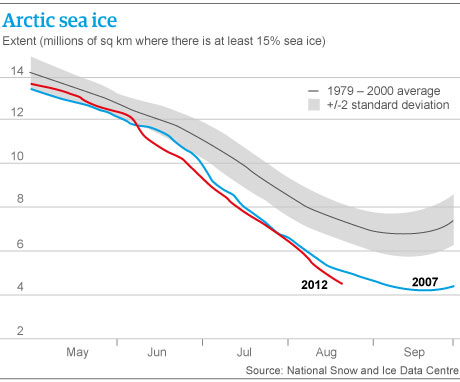"Unless something really unusual happens we will see the record broken in the next few days. It might happen this weekend, almost certainly next week," said Julienne Stroeve, a scientist at the US National Snow and Ice Data Centre (NSIDC) in Boulder, Colorado.
Because ice thickness, volume, extent and area are all measured differently, it may be a week before there is unanimous agreement among the world's cryologists (ice experts) that 2012 is a record year. Four out of the nine daily sea ice extent and area graphs kept by scientists in the US, Europe and Asia suggest that records have already been broken.
"The whole energy balance of the Arctic is changing. There's more heat up there. There's been a change of climate and we are losing more seasonal ice. The rate of ice loss is faster than the models can capture [but] we can expect the Arctic to be ice-free in summer by 2050," said Stroeve.
"Only 15 years ago I didn't expect to see such dramatic changes – no one did. The ice-free season is far longer now. Twenty years ago it was about a month. Now it's three months. Temperatures last week in the Arctic were 14C, which is pretty warm."
The consequences of losing the Arctic's ice coverage for the summer months are expected to be immense. If the white sea ice no longer reflects sunlight back into space, the region can be expected to heat up even more than at present. This could lead to an increase in ocean temperatures with unknown effects on weather systems in northern latitudes.
